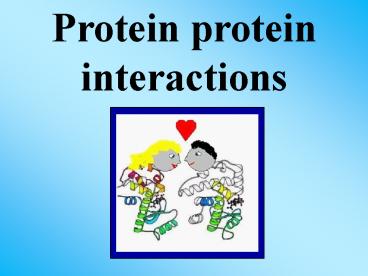Protein protein interactions - PowerPoint PPT Presentation
1 / 27
Title: Protein protein interactions
1
Protein protein interactions
2
Introduction
Protein b unknown
Protein a known
Interaction
3
Introduction
Protein b Function b
Protein a Function a
Interaction
4
Old world vs. new world
MAINLY IN THIS LECTURE
5
Yeast two hybrid system Simple transcription
Transcription Complex
transcription
6
Yeast two hybrid system Hybrid proteins
7
Yeast two hybrid system Hybrid proteins
Transcription Complex
transcription
8
Yeast two hybrid system plasmids
9
Yeast two hybrid system plasmids
Yeast
10
Yeast array producing the array
A comprehensive analysis of protein-protein
interactions in S. cerevisiae P. Uetz et al..
- ORF Open Reading Frames
- Produce the yeasts 6000 ORFs
- 2 colonies of each transformation are
- inserted to the array
11
Yeast array producing the array
12
Yeast array using the array
- Selection of 192 easy proteins
MATING creating diploids
SELECTION OF LIVING COLONIES BASED ON HIS3
PRODUCTION
DETECTING THE ARRAYS PROTEIN ACCORDING TO
ITS POSITION
13
Yeast array - results
BEFORE (Pcf11)
AFTER
14
Yeast array - Results over-view
- 2 undependable assays were preformed for each of
the 192 proteins. - 87 out of 192 proteins were detected as involved
in protein-protein interactions (passed the 2
assays)
- total of 281 interactions were detected
15
Activation Domain library
- Production of an AD library
MATING (haploids to diploids)
Transferring to a selection plate
Detecting the ORFs using PCR
16
Activation Domain library - results
- 817 out of 6000 proteins were detected as
involved in protein-protein interactions
- total of 692 interactions were detected
17
Array vs. library - Comparison
LIBRARY ARRAY
Rather quick Takes a lot of time Time
Huge number (6000X6000) Plenty (192X6000) Amount of checked interactions
1.8 3.3 Average number of Interactions for an interacting protein
14 48 Number of interactions of 12 proteins that were detected in both methods
CONCLUSIONS - THE METHODS QUALITIES
QUICK, SIMPLER, CHEAPER
SENSETIVE, BETTER RESULTS
18
Protein arrays producing the array
Protein chips from concept to practice Young-Sam
Lee et al..
- Producing the yeasts 6000 ORFs using plasmids
- Attaching histidine anchors to every protein
- Attaching the proteins to an array
19
Protein arrays using the array
- Pouring a protein onto the array
20
Mass Spectrometry of purified complexes
- The complex is isolated using the tag
- Each protein is identified by Mass Spectrometry
21
Mass Spectrometry of purified complexes
22
Synthetic Lethal Mutations
Whats lethal mutation?
- Examining the creature carrying them
23
Synthetic Lethal Mutations
Hypothesis these proteins are in interactions
METHOD 1 Synthetic Lethal Mutations
- Create an artificial DNA containing 2 genes with
conditional mutations
- Change the conditions and detecting dead
creatures
METHOD 2 Synthetic Lethal Mutations Arrays
- Pour different yeasts carrying different
mutations
MATING creating diploids
STIMULATING THE CREATION OF SPORES SELECTION
FINDING THE DEAD
24
Computational methods
- Mentioned in this seminar, mainly for
understanding proteins - Functions and using to detect interactions
Correlated mRNA expression
- Measuring mRNA levels under a variety of
cellular conditions
- Grouping the genes that have similar
transcriptional responses
25
Computational methods Genome analysis IN SILICO
Prokaryotic's operons
- Genes that are consistently in the same operon,
in the same order but in different and distanced
creatures
26
Computational methods Genome analysis
Phylogenetic profile
- Interacting proteins have a tendency to be
either present ot absent - together from fully sequenced genomes
Gene fusion
(ROSETTA STONE)
- One gene in creature A some genes in creature B
27
Computational methods Genome analysis
Otology relationships are not so clear, not
always reliable

